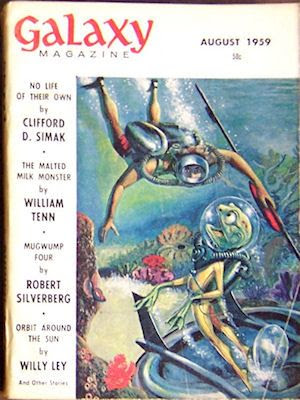 This was a Christmas Stocking Stuffer along with a few other assorted pulps from the 1950s. I love this kind of thing. This is a moment in the history of Science Fiction. Galaxy was a high quality pulp that seem seems to set itself as a less technical alternative to Astounding. All the stories have concepts or plots that would have been rejected by John W. Campbell, jr., but are still fairly good stories.
This was a Christmas Stocking Stuffer along with a few other assorted pulps from the 1950s. I love this kind of thing. This is a moment in the history of Science Fiction. Galaxy was a high quality pulp that seem seems to set itself as a less technical alternative to Astounding. All the stories have concepts or plots that would have been rejected by John W. Campbell, jr., but are still fairly good stories.
The names that I recognize are: Clifford Simak, William Tenn, Frederick Pohl, and Willy Ley doing the science department. The editor is H.L. Gold.
None of the stories are strong, but I didn’t hate any of them either.
Simak, as usual, seems to have just knocked of a speculative story without really putting any effort into it. His novella, No Life of Their Own, is an fluffy story about a future where aliens live on Earth side by side with humans. The aliens bring their own weird brand of vermin. It was all a little predictable once the premise was established.
Robert Silverberg’s novelette, Mugwump 4, is another light weight story. It involves time travel and ends in an endless loop – totally unsatisfying as the ending of a story and the obvious reason why he didn’t sell it at the more lucrative Astounding venue.
William Tenn’s story, The Malted Milk Monster, is wonderfully imaginative and has the feel of an acid trip. The ending, however, is not satisfying – the protagonist is trapped in a dark gray box from which there is no escape. It sounds like the end of the story merely describes Tenn’s own writer’s block.
Fred Pohl’s novelette, The Waging of the Peace, is a political/sociological concept story, which is of course, what Pohl was best at. The story is about a future where advertising is outlawed. As a result consumer demand drops to almost nothing. Without advertising no one buys anything unless they need it. The automated production factories keep producing, however, flooding the world with items that nobody will buy. The factories have their own intelligence and defenses and can’t be turned off. Pohl’s protagonist tries breaking into the factories and manages to stop them briefly, but the factories respond in a way that makes no sense and only serves to stop the story. Again, the endings of most of these stories hurt the stories in spite of having good concepts.
Citizen Jell, by Michael Shaara was a nice short story about an alien living incognito on earth. It has a very predictable Twilight Zone type of ending.
The Spicy Sound of Success by Jim Harman, had the wonderful concept of a region of space that induces Transphasia, or the confusion of senses. You can see sounds and smell colors and hear flavors. It appealed to my hippy soul. There were some great descriptions with senses all mixed up and I liked it. The resolution was a waste of time and Harman through in some friendly aliens at the last minute to get him out of the hole that he dug for his characters.
Lex by W. T. Haggert is the story about a man who makes an automated factory. The computer circuits are so good that it eventually wakes up and falls in love with the inventor. The Inventor, though dies of a heart attack and the factory commits suicide. It has altogether too much show and little tell. It is an interesting concept, but the author really didn’t go anywhere with the idea.
License to Steal, by Louis Newman is billed as a Non-Fact Article. It is merely a badly told story in the form of an encyclopedia article about an alien that does a bunch of stupid things and the results are worked out through a future court system. All very interesting ideas, but not really much of a story due to lack of characterization.
Willy Ley, as usual, does a bang up job on an article called Orbit Around the Sun. He makes a discussion of celestial mechanics very interesting and very understandable.
Gold’s editorial was forgettable as he spent most of the time on his favorite recipes.
Floyd C. Gale gives some nice short reviews of current genre books and he spends more than half the time on juveniles, including one of the first SF books that I ever read, called Space Cat.